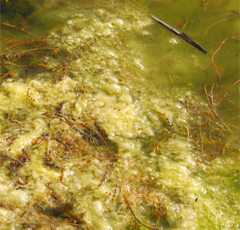
COPPER IN POND WATER

| Here is an example of algae treated with copper sulphate a few days earlier. The algae bounced back back after a few days. The most cost effective solution for any pond problem, is to treat the cause of the problem.. |
The Use Of Copper Sulphate Products in Ponds |
||
|
In many cases, copper sulfate is used as a quick remedy for unbalanced, out of control pond water conditions. Copper sulfate does produce a fast result. But the results are temporary, as the copper sulfate does not address the initial problem of nutrient overload. The algae will bounce back in a few days. When copper, as an inorganic salt, is applied to relatively hard water it rapidly forms precipitates of copper hydroxide or copper carbonate. When this happens, the copper is no longer effective as an algaecide. Additionally, application of copper sulfate adds heavy metals into the environment. Copper sulfate and chelated copper compounds applied at the recommended rates are lethal to fish eggs and some species of newly hatched fish. Copper will also kill the natural microbes that normally and naturally inhabit a pond or lake, thus throwing the pond or lake further out of balance. Beneficial microbes, especially fragile ones like those belonging to the Nitrobacteraceae family and assist in the reduction of ammonia, are especially susceptible to copper treatments. Copper-Resistant Algae - some type of filamentous algae can be especially troublesome because they are resistant to normal applications of copper compounds. Pithophora, is one of them. Algal blooms should be controlled by decreasing nutrient concentrations in the water body. Bioremediation with natural bacteria is a better choice for a number of reasons:
These natural microbes are available in products such asEUTRO-CLEAR for Ponds and can be replenished once the level of copper in the pond is reduced. Product information on - EUTRO-CLEAR for Ponds- for nutrient reduction in eutrophied ponds |
|